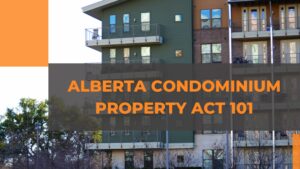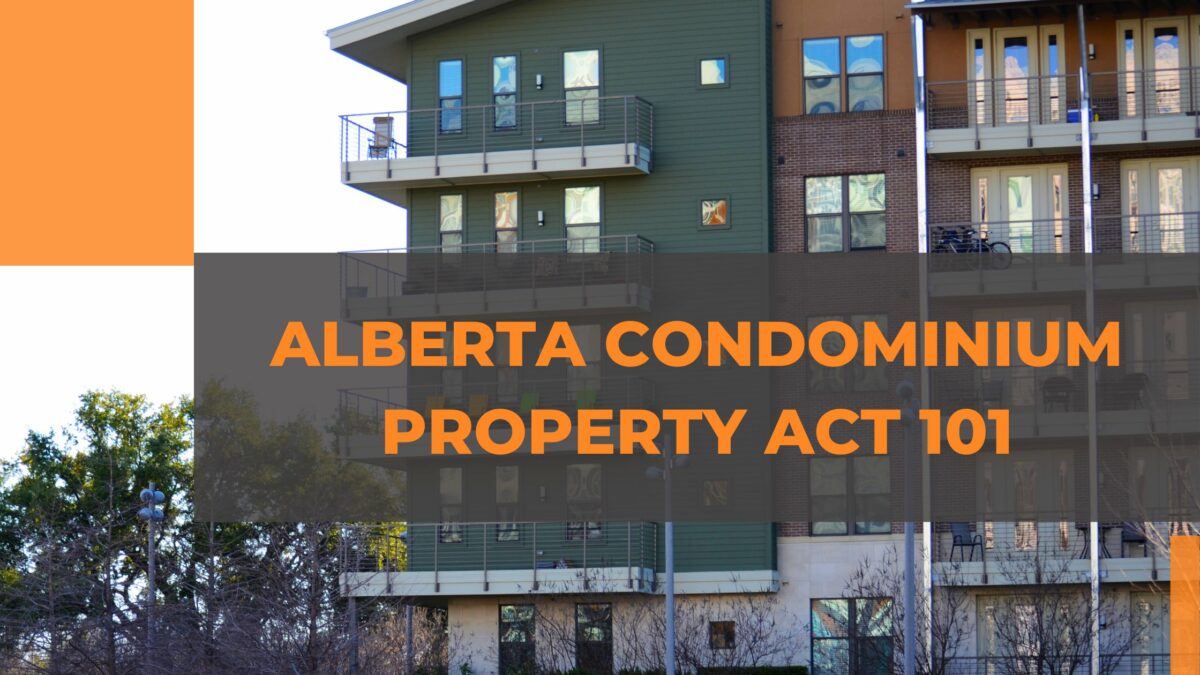Alberta Condominium Property Act 101

If you’re keen enough on condos to be sitting here reading this blog, you’ve at least heard of the Alberta Condominium Property Act – but do you know what sorts of details and information are actually in the act? Like, know what’s in there? Without looking it up?
If you’re on the up-and-up when it comes to Alberta’s condo-related legislation, congratulations – you get a gold star! ⭐️ For the rest of us, this blog is for you. First, we’ll take a high-level look at the Act as it stands today: what it’s all about, what it entails, and what recent changes have been made to the legislation in recent years.
Let’s jump on in.
Getting Your Act Together: Five Things to Know About the Alberta Condo Act
1. What Is the Act All About, Really?
The Alberta Condominium Property Act is written to be an all-encompassing piece of provincial legislation that outlines the rules and regulations related to operating, managing, and residing in condo properties across the province.
Across its 95 pages of legalese (it is a government document, after all!), the Act touches on three primary considerations to keep in mind:
- The rights and responsibilities of unit owners.
- The rights and responsibilities of condo corporations.
- Requirements about the various meetings a condo community must facilitate (including annual general meetings, special general meetings, and meetings between condo corporation board members).
It seems straightforward so far. Perfect – time to dig a little deeper, then.
2. The Rights and Responsibilities of Condo Unit Owners
As a condo owner, you’ve got rights – but those rights come with expectations and responsibilities that your fellow condo community members want you to uphold.
All the in-depth specifics can be found in the Condo Act itself. Still, in terms of a high-level overview, unit owners here in Alberta can expect to enjoy the following rights within their larger condo complex and community:
- To vote in matters presented to the owners for a vote.
- To access common areas (subject to building bylaws).
- To obtain information on the management or administration of the corporation.
- To use mediation, arbitration, or court action to resolve disputes with the corporation, the board, or other owners.
- To legally challenge improper conduct of a developer, condominium corporation, employee of a corporation, director, or other owner.
It’s not all just rights and privileges, though. The Act also mentions several responsibilities condo owners must adhere to to ensure the community is a place that everyone can enjoy and call home, including:
- To inform yourself about the Act, the regulation, the bylaws, the policies, and the governance of the condominium corporation.
- To abide by the Act, the regulation, the bylaws, the policies, and to have your family, tenants, and guests do so.
- To participate in governing the condominium corporation (i.e., by attending general meetings and information sessions, voting, or serving on the board or a committee).
- To read the minutes of the general meetings and board meetings, the budget and financial statements, and the corporation’s newsletter.
- To express your views, provide feedback to the board when requested, and put any complaints or concerns in writing to the board for follow-up.
- To keep the board aware of circumstances in the condominium complex that might affect funding or other decisions.
- To maintain your unit and any exclusive-use common property.
- To pay all condominium contributions and assessments or levies on time.
That might sound like a lot, but it’s all part and parcel of living in a close-knit community of individuals and families. By abiding by these rights and responsibilities, the condo community becomes a place everyone can be happy to call home – and that’s the overarching aim, after all!
3. The Rights and Responsibilities of Condo Corporations
Condo corporations wield a lot of power when you think about it. After all, their spending and decision-making charts are a course for the condo community! As Uncle Ben famously cautioned, though: with great power comes great responsibility (that’s two Spider-Man references in two blogs – not too shabby! 🕸).
When it comes to condo board membership, there’s typically a lot of responsibility to go around – including but certainly not limited to the following:
- Abiding by and enforcing the Act, regulations, and the corporation’s bylaws.
- Managing, administrating, and maintaining the common property.
- Maintaining, repairing, and replacing any unit or part of a unit (managed property that a corporation is required by bylaw to maintain, repair, or replace).
- Setting and collecting condominium contributions and dealing with the financial administration of the corporation.
- Preparing financial statements according to generally accepted accounting practices.
- Preparing and approving an annual operating budget.
- Placing and maintaining required insurance plans and policies.
- Establishing, maintaining, and administering the capital reserve fund.
- Preparing a report each fiscal year setting out the payments made into and out of the reserve fund and listing the depreciating property that was repaired or replaced during that year.
- Hiring and supervising employees and contractors, including a condominium manager or management company.
- Reviewing the bylaws and presenting any proposed changes to the owners for approval through a special resolution.
- Holding an annual general meeting.
- Responding to written document requests from owners, purchasers, or mortgagees within ten days.
When we said with great power comes GREAT responsibility, we weren’t kidding – what a list!
4. Meetings, Meetings, Meetings
When it comes to the specifics around meetings, there are many rules and regulations that the Act lays out. The big ones to keep in mind, though? We’ve got you covered for those.
The first thing to know is that the Condo Act accounts for three meetings: annual general meetings, special general meetings, and condo board meetings. We’ll leave condo board meetings for now, given how deep we went into condo board responsibilities in the previous section, so let’s chat about general meetings.
Any general meeting must see owners given at least 14 days’ notice before the event. An annual general meeting must take place twice per year. Special general meetings can be requested by owners representing at least 15% of the community’s unit factors. That’s how voting is conducted, via unit factors, as opposed to each unit or owner having an equally weighted vote.
Owners typically come together to vote on board member appointments, bylaw revisions, changes to the common property, or any other matter permitted under bylaws, regulations, and the Condo Act itself. Make sure you’re squared up with your condo corporation, though – any owner owing monies more than 30 days in arrears may lose their voting rights, so be sure you’re keeping up on those payments!
5. Recent Changes to the Condo Act
The Alberta Condo Act has remained mostly consistent since its inception, but there have been some recent changes worth mentioning – specifically, those that took place just this past year in 2022 and shortly before that in 2020.
You can check out the details of those changes through the linked Catalyst articles above, but suffice it to say, they’re detailed enough that they don’t quite fall under the introductory purview of this article – impactful though they might be.
Congrats – you’re now a proud graduate of Catalyst’s (entirely made-up) Alberta Condo Act 101! Ready for some 201-level knowledge? Get in touch with us at Catalyst Condo Management to learn more about the Alberta Condominium Property Act and how it affects your condo community today.

